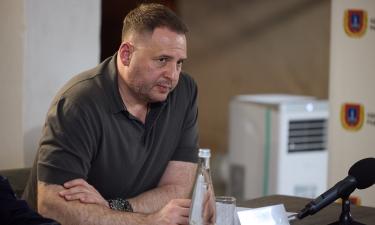Ukraine to leave Europe without Russian gas
It seems that Ukraine is not going to sit on its hands and watch Russia cutting its gas shipments to the former Soviet nation. Naftogaz, the Ukrainian oil and gas corporation, informed Russia’s Gazprom that it would reduce the amount of transit gas shipments to European countries. A telegram from Naftogaz to Gazprom said that Ukraine was going to cut gas supplies to Western Europe by 60 million cubic meters a day.

"It means that Gazprom will supply this amount of gas to Ukraine, but it won't reach European consumers," a spokesman for the Russian natural gas monopoly, Sergei Kupriyanov said.
He said the Naftogaz move will result in supplies of Russian gas to other parts of Europe dropping from some 386 million cubic meters to about 325 million a day.
Naftogaz spokesman Valentyn Zemlyansky would not comment directly on Gazprom's statement. However, he said that Ukraine had been supplying more than a regular amount of transit gas to Europe recently and would now decrease the amount to what he called a normal level. He insisted that Ukraine would not violate any of its transit obligations.
The two companies are in a debt and contract dispute, and Gazprom began reducing gas shipments to Ukraine earlier this week.
Gazprom, is demanding Ukraine sign documents resolving a US$600 million debt dispute and enabling further gas deliveries. On Monday, it cut shipments by 25 percent and then announced a further 25 percent cut Tuesday.
Ukraine consumes about a quarter of the Russian gas flowing through its territory, and Gazprom's cuts are related to the portion of the supplies intended for Ukraine.
Ukrainian officials have said that Gazprom had failed to pay transit fees, but Kupriyanov said Wednesday the company had fully paid them.
Gazprom had said that supplies to Europe would not be affected by the dispute, but Ukrainian officials have given conflicting signals.
A Naftogaz spokesman said Tuesday that the company could begin diverting transit gas if a second Russian cut were imposed, but another company spokesman said later that such a move was not in the immediate offing because of warm weather and substantial reserves.
Gazprom portrays the cutoffs as a straightforward commercial dispute, but it has considerable political resonance.
Gazprom's chairman is Russian President-elect Dmitry Medvedev, and critics accuse the Kremlin of using Gazprom as an instrument of pressure. Russia has watched with irritation as Ukrainian President Viktor Yushchenko pushes for membership in NATO and the EU.
Only about one-quarter of the gas imported by Ukraine is of Russian origin; the rest comes from Turkmenistan and Kazakhstan in pipelines controlled by Gazprom. Naftogaz said that by going ahead with the threatened reduction, Gazprom would be cutting the Central Asian gas as well as Russian-origin gas - a move that it said "grossly violates technical agreements between the two companies."
Gazprom last month threatened to cut supplies to Ukraine over a US$1.5 billion debt dispute, timed to coincide with Yushchenko's visit to Moscow. That cutoff was avoided by a last-minute agreement between Yushchenko and President Vladimir Putin.
But documents formalizing that agreement have not been signed by Ukraine's natural gas company, and Gazprom says Ukraine still owes US$600 million for gas delivered this year.
Zemlyansky, the Naftogaz spokesman, said the current dispute focused on the controversial middlemen companies that are used in the gas trade. He did not elaborate.
Critics say the laborious arrangement is essentially a mechanism for siphoning money into private pockets, and Ukrainian Prime Minister Yulia Tymoshenko has called for direct dealings with Gazprom.
Both the Central Asian gas and the Russian-origin gas that Ukraine imports are purchased from RosUkrEnergo, an intermediary company half-owned by Gazprom and half by two Ukrainian businessmen. The gas in turn is sold to UkrGazEnergo - jointly owned by Naftogaz and RosUkrEnergo - which then supplies Naftogaz.
The agreement reached last month by Putin and Yushchenko foresaw the elimination of the intermediaries, but Gazprom President Alexei Miller later said two other middlemen operations would be created, each to be half-owned by Gazprom and Naftogaz.
Subscribe to Pravda.Ru Telegram channel, Facebook, RSS!





